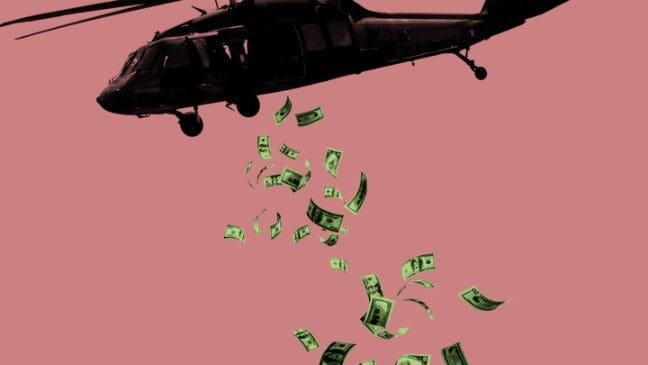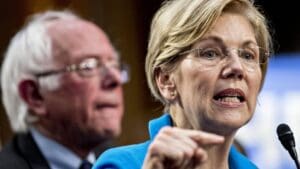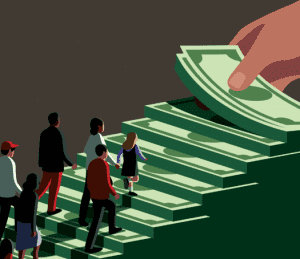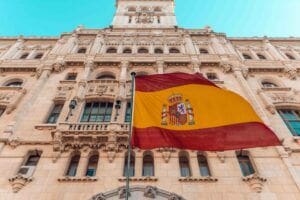That whrrrrr sound you hear is the Federal Reserve’s money printer firing up. The emergency public-health measures necessary to curb the spread of the novel coronavirus have thrown the economy into an unprecedented recession, one that threatens to become a second Great Depression if the government does not provide enough aid to businesses and families. Forecasters now anticipate that GDP will contract at a 24 percent rate in the second quarter, and that unemployment might swell as high as 41 percent, quadrupling the highest rate during the Great Recession.
The Fed has responded by pushing interest rates to zero, announcing an open-ended asset-buying program, and opening an array of lending facilities to keep markets liquid and calm. It’s doing everything it did in the Great Recession, and much faster. For its part, Congress has passed three coronavirus aid bills, the latest worth some $2 trillion. That still might not be enough. The Fed knows it might not be enough. Congress knows it might not be enough.
What might be enough? Helicopter money—a term that comes from a Milton Friedman essay in which the Fed tosses money … out of a helicopter. Put in a more technical and accurate manner: fiscal-monetary coordination or even outright debt monetization. Put in a manner regular people might understand: Get the central bank to create money and Congress to spend it.
If this sounds a little Zimbabwean, that’s because it is. Having a central bank help the government spend by magic-wanding cash into existence has long been considered an economic-policy taboo, a dangerous last resort for failing states. But no less an authority than Ben Bernanke has argued that it might be a government’s best option “under certain extreme circumstances.” Now many mainstream economists and Wall Street financiers are arguing that those extreme circumstances have arrived. “The risk here is metastasis into another Great Depression,” says Diane Swonk, the chief economist at Grant Thornton, an accounting and advisory firm. “It’s like a meteor hit the Earth off its axis. The Fed can’t get us back on the axis, but they’re the gravity to keep us rooted.”
The Fed has a number of traditional tools available to make sure the markets are feeling strong doses of gravity. It can make borrowing cheaper for households, nudge businesses to take on risk, set up loan programs, and keep markets liquid. It “can buy things or lend things in certain conditions,” says Joseph E. Gagnon, a former Fed official now at the Peterson Institute for International Economics. But, he said, it “can’t just give money out.”
In circumstances like these, the Fed’s inability to do that is something of a problem. Lower interest rates are not going to prevent deflation during an economic freeze, and bond-buying is not going to help families whose income has been cut in half. The Fed’s tools, moreover, tend to affect Wall Street more than Main Street, and have the potential to stoke inequality, when it is lower-income families who are suffering the most right now.
The boldest option would be for Congress to authorize the central bank to abandon tradition and start sending checks or direct-deposit payments to households. For years, academics and some members of Congress have pushed for the Fed to create digital-dollar accounts. With a keystroke, the Fed could make money appear in people’s accounts, whether financed by its own money printer or by Treasury funds. I asked Gagnon if he thought the Fed would be doing that if it had the option. “Oh, there’s no doubt,” he said.
The central bank could also make new money available for Congress to spend, and commit to not offsetting that stimulus by raising interest rates. In fact, the Fed is arguably doing that already through its open-ended bond-buying. “The Fed has basically green-lit as much fiscal policy” as Congress passes, Timothy Duy, an economist at the University of Oregon, told me. “Do we effectively have some kind of monetary-fiscal coordination going on? It seems fairly clear there’s an implicit agreement on the part of the Fed that they’ll absorb any [debt] Treasury issues without question, as long as the economy needs it.”
This kind of coordination comes with risks, of course. But the chance that the United States would turn into Zimbabwe or Venezuela is not a significant one at the moment, thankfully. Investors would have to flee the dollar for that to happen, which seems unlikely. And the Fed can control any excess inflation it happens to gin up.
Still, the more the Fed does, the more it may look like an agency that is unaccountable to voters has, in effect, taken spending authority away from Congress. “I am a very profound little-d democrat when it comes to monetary policy and central banks,” Peter Conti-Brown, a professor at the Wharton School at the University of Pennsylvania, told me. “I think their mandates should be narrow, and politics is ugly but important.”
The other side of the same coin: If the Fed goes outside the bounds of its job, that could reduce pressure on Congress to do its job in the first place. “It would be disastrous if we end up in another situation where we put ourselves at the mercy of the Fed and expect them to do more and more and more,” says Stephanie Kelton, a progressive economist. “There is that other policy lever, and you’ve got to pull it.” It is Congress, not the Fed, that needs to step up.
The biggest risk of all is that this temporary, necessary recession leads to bankruptcies, insolvencies, evictions, and job losses, causing a hard-to-combat recession and permanent economic damage. Given that risk, tossing money out of a helicopter does not seem like such a bad idea.





















